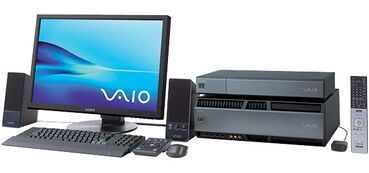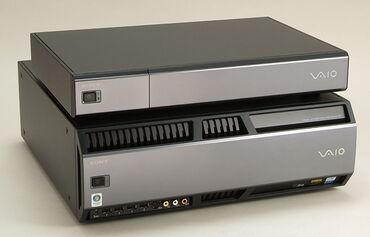VGC-RM
More actions
Overview

The VGC-RM series, officially named "VAIO R master", is the top-of-the-line VAIO computer that Sony offered in 2006. The model was targeted towards professionals, especially video-editing and photographic professionals, with its biggest selling point being "1080p Full HD capable", allowing users to edit high quality Full HD footages.

Being the last tower-style VAIO, the model utilized a "split tower" design, spilitting the machine into two chassis: the main unit which holds all processing power and hard drives, and an "Access Unit" which provides the most used ports (USB, eSATA, audio, card reader etc.) and two 5.25-inch drive bays for easy access, which is connected to the main unit via a custom, 1.8-m cable which sends USB and PCIe signals. It was marketed that users could place the main unit under the desk while placing the Access Unit on the desk for easy access of frequently used ports and saving up desktop space.
Specs wise, being a member of the flagship VAIO R series, the VGC-RM was equipped with the most powerful hardware of the time. Notably, it was the first branded desktop sold in the USA to feature quad-core processor. The model is equipped with Intel Core 2 series processors across the board, with higher end models using quad-core Core 2 Quad or even the most powerful Core 2 Extreme lineup. The model uses DDR2 RAM, with the maximum capacity being 4GB. For the graphics, the model uses NVIDIA graphics cards, ranging from mid-range GeForce 7600 GS to professional Quadro FX 1500 depending on user's choice. The model also inherited previous VAIO R models' tradition of using multiple drives in RAID mode for the best disk read and write performance. The model can be equipped with 2 to 6 3.5-inch SATA II hard drives, and can run in RAID 0 or RAID 1 mode. The model has 4 hard drive bays placed at the front of the machine for easy, tool-less access of hard drives, which is marketed as a main feature to video editing professionals.
Detailed Specs
| Processor: | RM*0 Models: | Intel Core 2 Duo E6300 / E6400 / E6600 / E6700 / Core 2 Extreme X6800 | |
| RM*1 Models: | Intel Core 2 Duo E6300 / E6400 / E6600 / E6700 / Core 2 Quad Q6600 / Core 2 Extreme X6800 / QX6700 | ||
| RM*2 Models: | Intel Core 2 Duo E6320 / E6420 / E6700 / Core 2 Quad Q6600 / Core 2 Extreme QX6700 | ||
| RM*3 Models: | Intel Core 2 Duo E6550 / E6750 / E6850 / Core 2 Quad Q6600 / Q6700 / Core 2 Extreme QX6850 | ||
| RM*4 Models: | Intel Core 2 Duo E8200 / E8400 / E8500 / Core 2 Quad Q6600 / Q6700 / Core 2 Extreme QX9650 | ||
| RM*5 Models: | Intel Core 2 Duo E8300 / E8400 / E8500 / Core 2 Quad Q9300 / Q9450 / Q9550 / Core 2 Extreme QX9650 |
| Graphics: | RM*0 Models: | NVIDIA GeForce 7600 GS (256MB GDDR2) / 7600 GT (256MB GDDR3) | |
| RM*1 Models: | NVIDIA GeForce 7600 GS (256MB GDDR2) / 7600 GT (256MB GDDR3) / Quadro FX 1500 (256MB GDDR3) | ||
| RM*2 Models: | NVIDIA GeForce 7600 GS (256MB GDDR2) / 8600 GTS (256MB GDDR3) / Quadro FX 1500 (256MB GDDR3) | ||
| RM*3/4/5 Models: | NVIDIA GeForce 8500 GT (256MB GDDR3) / 8600 GTS (256MB GDDR3) / Quadro FX 1500 (256MB GDDR3) |
Chipset: Intel P965 Express (RM*0/1/2 models) / Intel P35 Express (RM*3/4/5 models)
Memory: DDR2 DIMM (667MHz for P965 chipset, 800MHz for P35 chipset), Stock: 512MB to 3GB, Maximum capacity: 4GB
Display: Optional 19" SXGA (SDM-G96D) / 19" WXGA+ (VGP-D19WD1) / 24" WUXGA (SDM-P246W or VGP-D24WD1)
Storage: 4x front accessible 3.5" SATA hard drive bay and 2x internal 3.5" SATA hard drive bay in main unit, RAID 0/1 capable; 2x 5.25" drive bay (one IDE, one SATA) in Access Unit, DVD-RW or Blu-ray drive optional
Weight: ~15kg for main unit, ~6kg for Access Unit
Operating System: Microsoft Windows XP Home Edition / Professional (both SP2; RM*0 models only) / Microsoft Windows Vista Home Premium or Ultimate (both SP0; later models only)
MSRP: Around 192,000 yen to 550,000 yen (in 2006)
Daily Usage Today
The machine is perfectly capable of daily tasks e.g. web browsing, document processing and 720p YouTube playback thanks to its powerful Core 2 processors and plenty of room for upgradability. The dated graphics card could be a bottleneck, though it can be replaced with conventional PCIe graphics cards on the market. The RAM ceiling is low for its chipset capability, but 4GB of RAM is enough to handle Windows 10 pretty well with the help of an SSD. Note that the machine uses high TDP components especially those with Core 2 Extreme processors, so there may be some fan noise when running in heavy load.
Be aware that the cable for Access Unit is custom-made and not available anywhere else, so remember to keep the cable with your machine! It is extremely difficult to find one in the second hand market!
